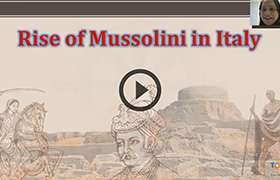ICSE Class 10 Answered
Explain any five aspects of the impact of Fascism on Italy.
Asked by Topperlearning User | 23 Jul, 2015, 03:51: PM
Following are five important aspects of the impact of Fascism on Italy:
- Mussolini devoted himself to make Italy a powerful nation and carried out extensive administrative and economic reform measures. He south to arrest the further devaluation of the Italian currency, established hydroelectric power plants to overcome the shortage of coal, brought more land under cultivation and improved and expanded the transport system.
- Express measures were undertaken in order to reduce unemployment. Factories and mills were nationalised; various syndicates were established to improve relations between the capitalists and the workers. Mussolini started an extensive public works programme which included construction of roads, bridges, canals, railways, schools, hospitals, etc.
- Many new schools, colleges and libraries were established and programmes were initiated to eradicate illiteracy.
- Military training was made compulsory and efforts were made to enhance the naval power to match it with that of countries like France and Germany.
- Mussolini conceptualised and executed an aggressive foreign policy to revive the past glories of the Roman Empire and to make Italy a great nation again.
Answered by | 23 Jul, 2015, 05:51: PM
Concept Videos
ICSE 10 - History and Civics
Asked by ushanihar12 | 17 Feb, 2019, 10:10: PM
ICSE 10 - History and Civics
Asked by anujbajpai44 | 15 Feb, 2019, 10:41: PM




